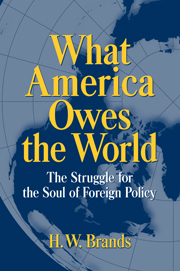Book contents
- Frontmatter
- Contents
- Preface
- 1 Exceptionalists All! The First Hundred Years
- 2 Brooks Adams: Marx for Imperialists
- 3 Walter Lippmann and a New Republic for a New Era
- 4 When the Future Worked and the Trains Ran on Time: Lincoln Steffens
- 5 Dr. Beard's Garden
- 6 Kennan, Morgenthau, and the Sources of Superpower Conduct
- 7 Reinhold Niebuhr and the Foreign Policy of Original Sin
- 8 God Blinked but Herman Didn't
- 9 On Wisconsin: Madison and Points Left
- 10 The Brief of Norman's Woe: Commentary and the New Conservatism
- 11 It Ain't Over till It's Over – and Not Even Then
- Note on Sources
- Index
9 - On Wisconsin: Madison and Points Left
Published online by Cambridge University Press: 25 March 2010
- Frontmatter
- Contents
- Preface
- 1 Exceptionalists All! The First Hundred Years
- 2 Brooks Adams: Marx for Imperialists
- 3 Walter Lippmann and a New Republic for a New Era
- 4 When the Future Worked and the Trains Ran on Time: Lincoln Steffens
- 5 Dr. Beard's Garden
- 6 Kennan, Morgenthau, and the Sources of Superpower Conduct
- 7 Reinhold Niebuhr and the Foreign Policy of Original Sin
- 8 God Blinked but Herman Didn't
- 9 On Wisconsin: Madison and Points Left
- 10 The Brief of Norman's Woe: Commentary and the New Conservatism
- 11 It Ain't Over till It's Over – and Not Even Then
- Note on Sources
- Index
Summary
The messy little war in Vietnam dashed far more than Kahn's career in nuclear studies: It exploded the consensus on which American Cold War vindicationism rested. By the late 1960s, consensus thinking in the United States had been under assault for some time, and on many issues besides foreign affairs. The domestic problems of the 1960s were no greater, objectively speaking, than those of the 1950s, but to the myriad reformers and would-be revolutionaries of the later decade, that was hardly a recommendation. The turbulence of the 1960s was largely a generational matter: Where the survivors of the Great Depression and World War II appreciated the peace and prosperity of the 1950s, their children, knowing nothing but peace and prosperity, found their parents’ world insufferably boring. Their parents’ tolerance for imperfection they took for hypocrisy; their parents’ desire for community, crushing conformism.
The revolt of the 1960s wasn't entirely generational, of course. America did have some real problems. Poverty persisted, as Michael Harrington documented in The Other America. Prejudice and discrimination continued to typify treatment of African-Americans, who were taking their fate into their own hands and demanding an end to segregation. Women, in certain respects, suffered discrimination almost as crippling as that confronting blacks.
But many of the complaints of the decade focused on the inner life, on matters that earlier would have seemed trivial. Paul Goodman captured the feeling in Growing Up Absurd when he lamented the alienation and ennui that condemned the middle class to an existence of respectable banality.
- Type
- Chapter
- Information
- What America Owes the WorldThe Struggle for the Soul of Foreign Policy, pp. 238 - 262Publisher: Cambridge University PressPrint publication year: 1998



